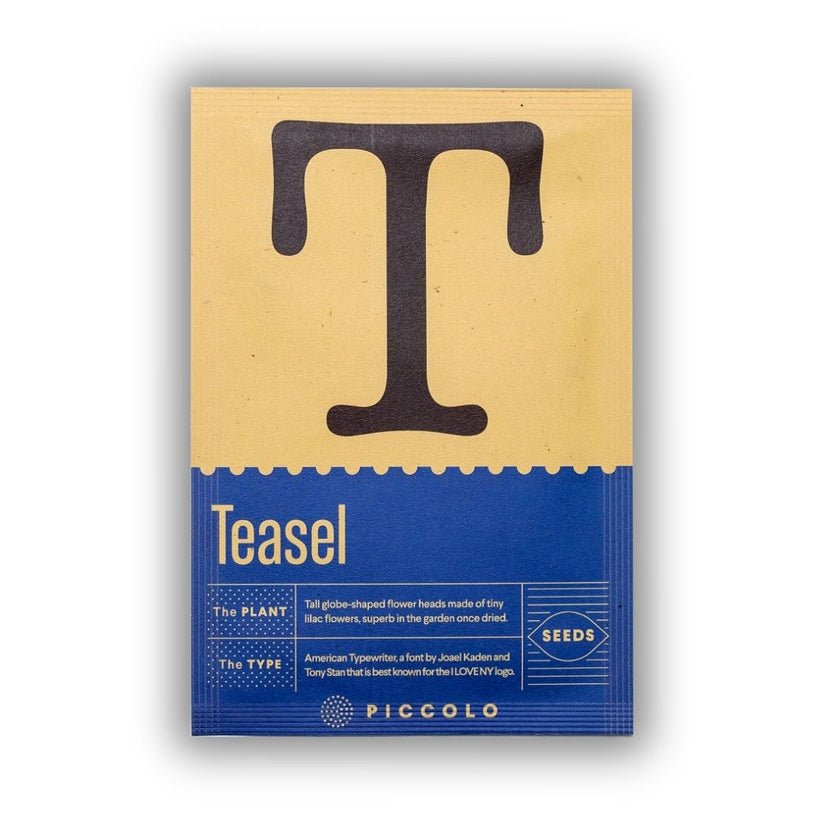Teasel
THE PLANT
Tall globe-shaped flower heads made of tiny lilac flowers, superb in the garden once dried.
Name
Teasel
Variety
Latin name
Dipsacus sativus
Seed quantity
0,1 grams
Packet size
9 x 12,5 cm
Packet material
Made from paper produced using tomato waste fibers, it can be disposed of in biodegradable waste
Plant size
120-200 cm height, 60-90 cm spread
How to grow
Sowing
Outdoor Early spring or autumn
Indoor 8-10 weeks before last frost
Germination
Time 14-21 days
Temperature 15-20°C
How to sow
Direct sow Sow seeds on soil surface; press lightly but do not cover
Indoor Surface-sow in trays, ensure light exposure
Caring
Light Full sun
Watering Moderate; allow soil to dry between waterings
Soil Well-drained, loamy or sandy soil
Feeding Minimal feeding; teasel is low-maintenance
Growing tip
Teasel attracts bees and birds with its unique seed heads. Deadhead after flowering if you wish to prevent self-seeding, as it can spread easily.
Harvesting
Harvest seed heads in late summer when dry for decorative use. The spiky seed heads are often used in dried floral arrangements.
THE PLANT
Tall globe-shaped flower heads made of tiny lilac flowers, superb in the garden once dried.
Name
Teasel
Variety
Latin name
Dipsacus sativus
Seed quantity
0,1 grams
Packet size
9 x 12,5 cm
Packet material
Made from paper produced using tomato waste fibers, it can be disposed of in biodegradable waste
Plant size
120-200 cm height, 60-90 cm spread
How to grow
Sowing
Outdoor Early spring or autumn
Indoor 8-10 weeks before last frost
Germination
Time 14-21 days
Temperature 15-20°C
How to sow
Direct sow Sow seeds on soil surface; press lightly but do not cover
Indoor Surface-sow in trays, ensure light exposure
Caring
Light Full sun
Watering Moderate; allow soil to dry between waterings
Soil Well-drained, loamy or sandy soil
Feeding Minimal feeding; teasel is low-maintenance
Growing tip
Teasel attracts bees and birds with its unique seed heads. Deadhead after flowering if you wish to prevent self-seeding, as it can spread easily.
Harvesting
Harvest seed heads in late summer when dry for decorative use. The spiky seed heads are often used in dried floral arrangements.
THE PLANT
Tall globe-shaped flower heads made of tiny lilac flowers, superb in the garden once dried.
Name
Teasel
Variety
Latin name
Dipsacus sativus
Seed quantity
0,1 grams
Packet size
9 x 12,5 cm
Packet material
Made from paper produced using tomato waste fibers, it can be disposed of in biodegradable waste
Plant size
120-200 cm height, 60-90 cm spread
How to grow
Sowing
Outdoor Early spring or autumn
Indoor 8-10 weeks before last frost
Germination
Time 14-21 days
Temperature 15-20°C
How to sow
Direct sow Sow seeds on soil surface; press lightly but do not cover
Indoor Surface-sow in trays, ensure light exposure
Caring
Light Full sun
Watering Moderate; allow soil to dry between waterings
Soil Well-drained, loamy or sandy soil
Feeding Minimal feeding; teasel is low-maintenance
Growing tip
Teasel attracts bees and birds with its unique seed heads. Deadhead after flowering if you wish to prevent self-seeding, as it can spread easily.
Harvesting
Harvest seed heads in late summer when dry for decorative use. The spiky seed heads are often used in dried floral arrangements.


